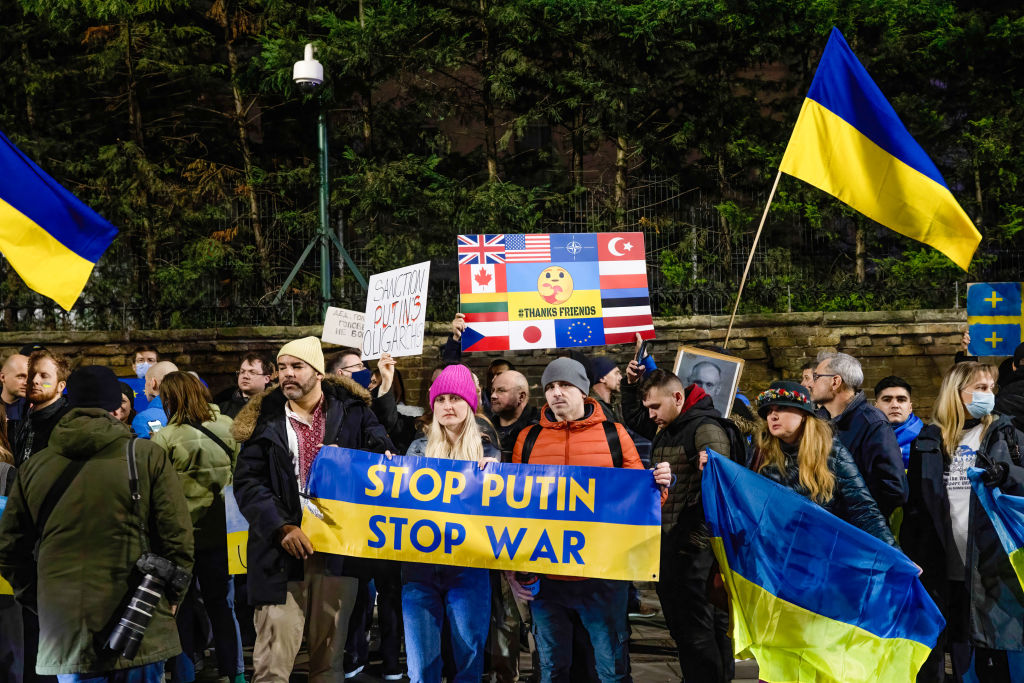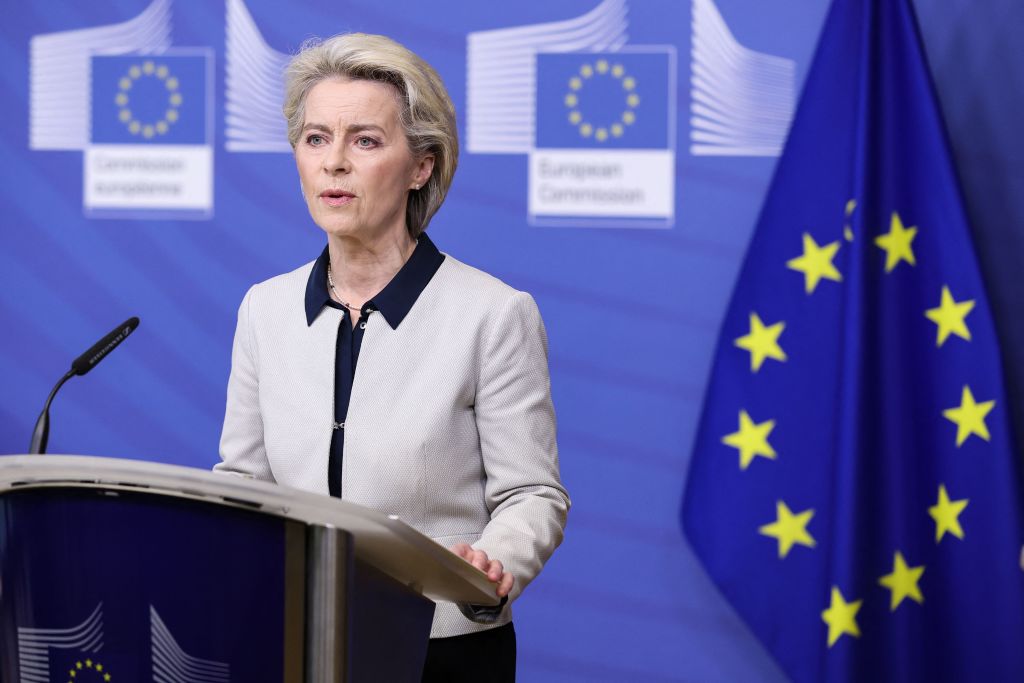Countries across the globe have appealed to Russia to stop its invasion of Ukraine and promised to impose sanctions after Russian President Vladimir Putin announced a military operation to protect, he says, civilians in the breakaway republics of Donetsk and Luhansk.
Ukraine’s Embassy in London called Putin’s order an “unprovoked war,” adding that Russia is waging “a war against Europe, a war against the whole world.”
Media reports say that explosions have been heard in the Ukrainian capital Kyiv, as well as in Kharkiv and other areas of the country.
The Russian president warned against foreign intervention in the unfolding conflict. “To anyone who would consider interfering from the outside: if you do, you will face consequences greater than any you have faced in history. All relevant decisions have been taken,” Putin says. “I hope you hear me.”
U.S. President Joe Biden said during a Thursday press conference that he “had no idea” what Putin’s threat meant but stated that the Russian president “had much larger ambitions than Ukraine” and that he “wants to reestablish the Soviet Union.”
What the U.N. says about Ukraine
The Russian president’s announcement came as the United Nations Security Council was holding an emergency meeting over the crisis in Ukraine. Ambassadors from countries including the U.S., the U.K. and Albania denounced the escalation of the conflict in the Donbas region in eastern Ukraine.
U.N. Secretary-General Antonio Guterres attended the meeting, AP reported, and told Russia: “Stop your troops from attacking Ukraine. Give peace a chance.”
The Security Council is chaired by Russia. In a broadcast of the meeting, Sergiy Kyslytsya, Ukraine’s ambassador to the U.N., could be heard demanding Russia relinquish its duties as council chair, imploring: “Call Putin. Call [Russian foreign minister Sergey] Lavrov to stop aggression.”
The U.N. has said that it will free up $20 million in humanitarian aid for Ukraine.
Read More: What to Know About Russia’s Military Operation in Ukraine
U.S. ambassador Linda Thomas-Greenfield also lamented that Putin had “ordered that last step.”
“As we are gathered in the council seeking peace, Putin delivered a message of war in total disdain for the responsibility of the council,” she said. “The council will need to act and we will put a resolution on the table tomorrow.”
As the meeting ended, Ukraine’s Kyslytsya told the Russian envoy: “There is no purgatory for war criminals. They go straight to hell, ambassador.”

The U.S. response to Russia’s invasion
U.S. President Joe Biden announced new sanctions on Russia Thursday, promising to work with allies to limit Russia’s ability to access technology, “degrade its industrial capacity for years to come,” and “strike a blow to their ability to continue to modernize their military.” He said the U.S. has already sanctioned major Russian banks, which collectively hold about $1 trillion in assets, and will also target Russian elites and their family members. “These are people who personally gain from the Kremlin’s policies and they should share in the pain.”
Biden strongly condemned Russian actions, which he said were in response to “outlandish and baseless claims that Ukraine was about to invade and launch a war against Russia.”
“Putin is the aggressor. Putin chose this war and now he and his country will bear the consequences,” Biden said.
Biden also said that U.S. forces would “not be engaged in the conflict with Russia in Ukraine” but that they would help defend NATO allies in the East and be prepared to respond to any Russian cyberattacks on American companies and critical infrastructure.
Read More: How the West Can Stop Putin
Ukraine has expressed the desire to join NATO, a move which Putin condemns.

What other countries are saying about the invasion of Ukraine
Jens Stoltenberg, secretary-general of NATO, denounced Moscow’s “reckless” attack on Ukraine which puts “countless civilian lives” at risk.
“I call on Russia to cease its military action immediately and respect Ukraine’s sovereignty and territorial integrity,” he stated, adding that the attack breached international law and posed a serious threat to Euro-Atlantic security.
The military alliance plans a virtual summit of its leaders on Friday to discuss the situation.
Canada, a member of the NATO alliance, also reproached the Kremlin and demanded that Russia “withdraw all military and proxy forces” in Ukraine.
Read More: Russia’s Assault on Ukraine Poses Huge Risks for Europe
“We continue to stand with Ukraine, its people, and the Ukrainian Canadian community,” Canadian Prime Minister Justin Trudeau said in a statement. “Russia’s brazen acts will not go unpunished.”
Many other countries in Europe have condemned Russia’s operations, with the European Union saying that it and its member-states were prepared to provide urgent humanitarian response to Ukraine.
“By its unprovoked and unjustified military actions, Russia is grossly violating international law and undermining European and global security and stability,” E.U. presidents Charles Michel and Ursula von der Leyen said in a joint statement.

In a televised address, von der Leyen announced a raft of sanctions against Russia “designed to take a heavy toll on the Kremlin’s interests and their ability to finance war.”
“We will target the strategic sectors of the Russian economy by blocking the access to technologies and markets that are key for Russia,” von der Leyen said. “We will freeze Russian assets in the European Union and stop the access of Russian banks to European financial markets.”
According to AP, German Chancellor Olaf Scholz called Russia’s attack “a blatant violation of international law” and said that “It cannot be justified by anything.” In the days before the attack, Germany suspended approval of the Nord Stream 2 gas pipeline from Russia.
China advised its citizens in Ukraine that “Social order is chaotic and out of control, especially in the cities.” It said Chinese in the country should stay home or place a Chinese flag on their vehicles if they needed to travel, AP reported.
Beijing has avoided any criticism of Moscow. “Unlike the U.S., which keeps sending weapons to Ukraine, creating fear and panic and even playing up the threat of war, China has been calling on all parties to respect and pay attention to each other’s legitimate security concerns,” said Hua Chunying, a Foreign Ministry spokesperson, adding that “all parties should work for peace instead of escalating the tension or hyping up the possibility of war.”
China also announced it was open to wheat imports from Russia, a move that could soften the impact of Western sanctions.
Meanwhile, Japanese Prime Minister Fumio Kishida said Japan would work closely with G-7 countries in response to the crisis. “The Russian attack shakes the foundation of the international order that no unilateral change to the status quo by force should be tolerated and we strongly condemn Russia,” he was quoted as saying by Kyodo News.
Read More: Putin Threatens Not Just Ukraine But the West
Finland’s President Sauli Niinistö said Russia’s military measures may have been aimed at Ukraine, but they were also “an attack on the entire European security order.”
British Prime Minister Boris Johnson said he was “appalled” by the turn of events in Ukraine. In a tweet, Johnson said he had also spoken to Ukraine’s president to discuss next steps.
“President Putin has chosen a path of bloodshed and destruction by launching this unprovoked attack on Ukraine,” the British leader said.
In a televised address, Johnson said that the U.K. and its allies had agreed “a massive package of economic sanctions” to “hobble the Russian economy.” He also announced plans to “cease the dependence on Russian oil and gas that for too long has given Putin his grip on western politics.”
Lithuania, a European country separated from Ukraine by Belarus, declared a state of emergency Feb. 24. President Gitanas Nauseda told the NATO country’s army to deploy along its borders in response to “possible disturbances and provocations due to large military forces massed in Russia and Belarus”.
While countries in the West have not indicated that they would send troops into Ukraine at the risk of triggering a broader European war, NATO has reinforced its member states in Eastern Europe.
More Must-Reads from TIME
- Cybersecurity Experts Are Sounding the Alarm on DOGE
- Meet the 2025 Women of the Year
- The Harsh Truth About Disability Inclusion
- Why Do More Young Adults Have Cancer?
- Colman Domingo Leads With Radical Love
- How to Get Better at Doing Things Alone
- Michelle Zauner Stares Down the Darkness
Contact us at letters@time.com